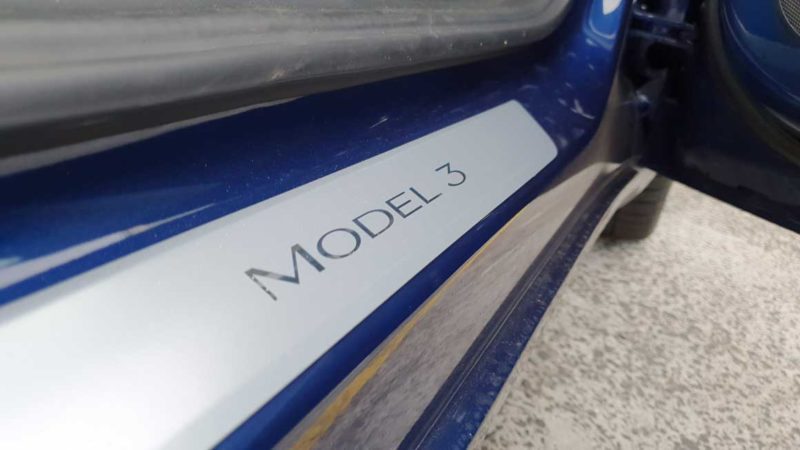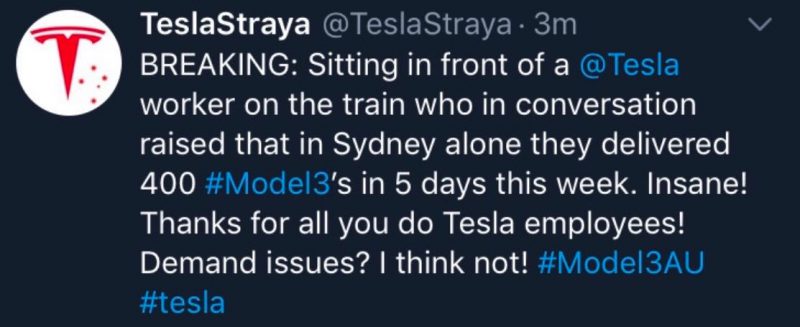Tesla Model 3 electric vehicle smashes sales records, recasts Australia car market

It is believed that in the month of September alone, Tesla delivered more Model 3 EVs in Australia than its entire sales tally of Model S and Model X electric vehicles for 2018, which stood at around 1200.
There is a suggestion that Model 3 sales for the month may have reached 1,500. But even at 1,200, that equates to around 5 per cent of the monthly sales of all new passenger vehicles in the country, which have been falling like a stone over the past year.
The burst of activity that saw even Tesla chair Robyn Denholm helping out with Model 3 deliveries in Sydney last week meant that more than 200 of the electric vehicles were delivered a day in the last few days of the month.
 Social
media has been full of posts from admiring customers quoting Tesla
delivery staff about the pace of deliveries, from up to 70 a day in
Brisbane, 400 in five days in Sydney, and similar numbers in Melbourne
over the long weekend.
Social
media has been full of posts from admiring customers quoting Tesla
delivery staff about the pace of deliveries, from up to 70 a day in
Brisbane, 400 in five days in Sydney, and similar numbers in Melbourne
over the long weekend.Tesla won’t confirm any numbers for any individual country. A number of between 1,200 and 1,500 for September would rank the Model 3 in the top five of new passenger cars sales in Australia for the month, and in the top 15 of all new car sales, including the popular utes and SUVs.
And it won’t stop there.
Because Tesla does not release official data, gathering numbers is a combination of guesswork, counting boats and VINs (vehicle identification numbers), and picking up what you can from the delivery people.
As The Driven reported more than one week ago, an estimated 2,414 Model 3s arrived in Australia on the first three cargo ships. We have no reason to budge from that number, although what is not known is the number of Model 3s that arrived on the next three cargo ships documented by Tesla watchers, or any others.
It is true that most of these deliveries represent pent up demand, many from enthusiasts who put down a deposit more than three years ago. But the mere presence and visibility of these cars is likely to have a snowballing effect, as they have in other countries, as other consumers decide that they want one too.
And the advantage of Tesla over its competitors is that it has a ready supply, thanks to the Gigafactory in the US and the new Gigafactory that will be opened soon in China.
In Australia, overall EV sales had been rising before the arrival of the Model 3, thanks to new EVs rolled out by Hyundai, such as the Ioniq and the Kona. The success of the Model 3 takes those numbers to a new level.
Nissan has an updated Leaf, BMW has an updated I3, and other brands like VW and Mini are ready to roll out their first electric models.
The impact of EVs on the fossil fuel car market is already apparent. Sales of petrol and diesel cars have been plunging across the board in Australia for the last 18 months.
The industry blames “economic” factors, but ignores surveys and other anecdotal evidence that points to the fact that many people are simply hanging on to their current vehicles for longer because they are waiting to buy an EV they want and can afford.
Fleet buyers are already taking note, aware of new surveys that show that over the lease life of the vehicle, electric is already competitive with petrol and diesel options.
The impact is already being felt in the second hand market. As Bryce Gaton reports, in the UK the prices of second hand petrol and diesel cars has fallen, while the price of second hand EVs has risen.

Giles Parkinson is founder and editor of The Driven, and also edits and founded Renew Economy and One Step Off The Grid. He has been a journalist for 35 years and is a former business and deputy editor of the Australian Financial Review.
No comments:
Post a Comment